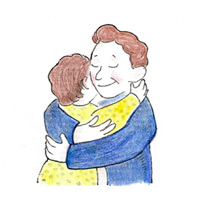I was watching some videos by Bob Bradbury the other day. They are very informative and inspiring. Bob tells a story about a father who tried the “I need a hug” suggestion. His small son was having a temper tantrum. The father got down on one knee and shouted, “I need a hug.” His son asked through his sobs, “What?” The father shouted again, “I need a hug.” His son asked incredulously, “Now?!?” The father said, “Yes, now.” The son said, “Okay,” and begrudgingly and stiffly gave his father a hug. Soon the stiffness disappeared and they melted into each others arms. After a few moments the father said, “Thanks, I needed that.” His son said, with a small tremor on his lips, “So did I.”
Sometimes hugs don’t work because the child is too upset to give or receive a hug. Adults can still try. If the child is unwilling, the adult can say, “We need some cooling off time, and I sure would like a hug whenever you are ready.” Some people ask, “After the hug, then what? What about the misbehavior?” Hugs can create an atmosphere where children are willing and able to learn. This may be the time to take time for training, ask what, why and how questions, give a limited choice, use distraction, engage in joint problem-solving — or to do nothing and see what happens next. Most of the time adults can help children stop misbehaving when they stop dealing with the “misbehavior” and deal with the underlying cause. Children DO better when they FEEL better. Encouragement is the key.
An excellent way to encourage children is to help them feel useful by making a contribution. What a wonderful way to let them contribute — by making you feel better when they give you a hug. Of course the fringe benefit is that they also feel better. Remember, a misbehaving child is a discouraged child. Perhaps encouragement is enough to change the behavior. Too many people think children must pay for what they have done in the form of blame, shame, or pain (other words for punishment). Try a hug instead.


No Comments yet!